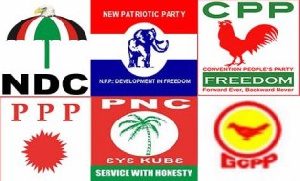A feature by Akolgo A. Samuel, Senior Civic Education Officer of National Commission for Civic Education, Bolgatanga Regional office
A key indicator of democracy and good governance in the developed world is credible and peaceful elections. However, elections in most developing countries, especially in Africa, have not been the best since they bring untold hardship, stress, violence and wanton destruction of life and property to the people.
Since the return of the country to constitutional rule, Ghana has chalked an impressive record of success—an unprecedented enjoyment of uninterrupted stable democratic rule. As a result, Ghana has been internationally acclaimed as one of the beacons of democratic governance—not only in West Africa, but also on the African continent as a whole.
Other enviable feats Ghana has achieved include; the successful conduct of Presidential and Parliamentary Elections – six (6) times in succession culminating in Peaceful transition and transfer of political power from a ruling Party to an Opposition Party in 2000 and in 2008. Ghanaians have also continued to uphold the supremacy of the constitution, the rule of law, free, vibrant and liberalized media landscape and the promotion of democracy in general. As a result of Ghana's record, there is the dire need to deepen and consolidate these democratic tenets and credentials.
It is in this regard that the Commission formed and inaugurated Interparty Dialogue Committees (IPDCs) in 2004 all over the constituencies in the country. The Committee is made up all registered political parties existing at the regional and constituency levels, Political party affiliated groups such as TEIN, TESCON, Faith Based Organizations, Civil Society/ Community Based Organizations, Independent Governance Institutions, the Secretaries and Chairmen of the political parties at the various levels and Security Services
The IPDCs act as a buffer zone in the constituencies to stem the tide of unnecessary suspicions and anxiety among political parties. It is a unifying body which can promote peace and resolve conflicts before, during and after the 2016 general elections in order to enhance political, economic and social progress and stability.
In addition to the conflict transformation and dialogue function, the Inter-Party Dialogue Committees, shall also help monitor and report cases of breach of rules and regulations relating to the conduct of the elections and the maintenance of public order. Some of the key violations to be monitored include the following:
· Distribution of money and other gifts to electorate, etc.
· Declaration of election results by political parties and their members.
· Defacing of posters.
· Biased media reportage.
· Campaign violence.
· The use of provocative and abusive language by political parties and their members.
· Rigging of elections. ? Abuse of incumbency.
The committees shall ensure that the political parties and candidates behave in a manner that is expected of them. The committee shall also monitor the behaviour of the electorate and supporters of political parties as they are often used by the parties to commit electoral offences. The committees shall monitor the behaviour of the political parties and at the same time educate the electorate and the supporters of political parties.
To achieve free, fair and violent-free 2016 Elections, the IPDCs will ultimately focus their attention on mediation and the resolution of petty conflicts. This entails monitoring the enforcement of the electoral rules and regulations, promoting peaceful security situations, identifying issues that have the potential to trigger electoral conflict, and also promoting information sharing to avoid rumour-mongering
The operational areas of the committees include:
· Monitoring of breaches of the rules and regulations regarding the electoral process.
· Investigating cases of abuse of the rules and regulations.
· Resolving petty conflicts and misunderstandings affecting the electoral process.
· Issuing of joint statements on political issues to defuse tension.
· Organizing seminars and workshops, discussions to educate its members and the general public on the rules and regulations regarding the electoral process.
· Holding of joint radio talk shows on democracy, peace and tolerance. ? Visiting homes and offices especially of political parties.
· Organizing floats, fun games, funfairs, peace matches, enacting drama to convey messages of tolerance and peaceful co-existence.
Opinions of Monday, 24 October 2016
Columnist: Akolgo, Samuel A.















